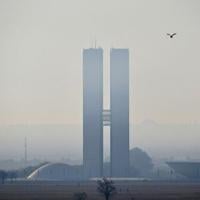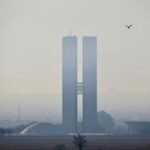With up to 80 percent of Brazil covered in smoke due to unprecedented wildfires, face masks previously used during the COVID-19 pandemic are being worn once again.
The largest country in South America has been suffering from pollution for weeks, along with other countries on the continent dealing with extreme drought and record fires.
Millions of hectares of forest and farmland have been burnt in Argentina, Brazil, Bolivia, Colombia, Ecuador, Paraguay, and Peru.
The Amazon basin, typically one of the wettest regions in the world, is currently facing its worst fires in almost twenty years, according to the EU’s Copernicus observatory.
Satellite images from the National Institute for Space Research (INPE) revealed that 80 percent of Brazil is covered in smoke.
“I am a smoker but I’ve been coughing more than usual,” said 20-year-old student Luan Monteiro in Rio de Janeiro.
Experts state that inhaling smoke from the fires is equivalent to smoking four or five cigarettes a day.
Air pollution can exacerbate bronchitis and asthma, with a higher risk the longer the exposure, according to pediatrician Renato Kfouri.
A hospital in Brasilia reported treating over twenty times more patients for respiratory issues compared to normal in recent days.
– ‘I put on my mask’ –
Homes in Brasilia have been using fans to blow moist air over towels and buckets of water to combat the dry air.
“When I go out, I put on my mask,” said 72-year-old Valderes Loyola in AFP.
Sao Paulo, the largest city in Latin America, was ranked the most polluted city in the world for several days last week.
A significant percentage of residents in Sao Paulo, Belo Horizonte, and Rio de Janeiro reported being heavily affected by pollution.
Searches for “air quality,” “humidifier,” and “air purifier” in Brazil surged in recent days.
Experts highlight the need for updated air quality monitoring and emergency plans to address smoke pollution in Brazil.
Less than 2.0 percent of municipalities in Brazil have air monitoring stations, leading to a lack of fine particle detection in smoke.
Most recent fires in Brazil are attributed to human activity, particularly linked to land clearing for agriculture.
Bolivia declared a national disaster due to forest fires affecting a large area in the Santa Cruz department.
rsr/app/nn/mlr/dw





